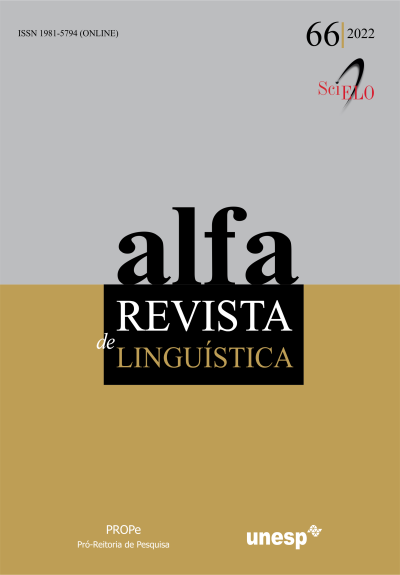Rhotics in final syllable coda of infinitive verb forms in “Caipira” Portuguese spoken in São Paulo state
DOI:
https://doi.org/10.1590/1981-5794-e13956Keywords:
pluridimensional dialectology, geolinguistics, phonetics, São Paulo state’s Portuguese, Caipira dialect, Médio Tietê, archiphoneme /R/ in syllable codaAbstract
Within the framework of Pluridimensional Dialectology (RADTKE; THUN, 1996; THUN, 2000, 2005 etc.), this study presents both a record and an analysis of variants in final syllable coda of the infinitive ending followed by a break, as they are currently spoken in the Médio Tietê region, the birthplace of São Paulo state's "Caipira" culture. The data were collected by Figueiredo Jr. (2019) in ten localities in the region: Santana de Parnaíba, Pirapora do Bom Jesus, Araçariguama, São Roque, Sorocaba, Itu, Porto Feliz, Tietê, Capivari, and Piracicaba. The methodological instrument applied is the Phonetic- Phonological Questionnaire made by "Atlas Linguístico do Brasil" (COMITÊ NACIONAL DO PROJETO ALiB, 2001). Eighty informants partook in the research, evenly women and men, young (18–36) and old (≥ 55) individuals, and with low and high education. The variants collected are: retroflex approximant ([ɻ]), alveolar tap ([ɾ]), phonetic zero ([Ø]), and alveolar trill ([r]). The analysis is based on descriptive statistics and pluridimensional dialectological cartography, from which a set of relevant conclusions is drawn. One of them is that the retroflex approximant occurs as the most frequent variant from a broad perspective and, from a correlational viewpoint, another one is that, according to evidence, the external factor influencing the prevalence of the retroflex approximant is not diastratic, nor diasexual, nor diatopic, but rather diagenerational.
Downloads
Downloads
Published
How to Cite
Issue
Section
License
Copyright (c) 2022 ALFA: Revista de Linguística

This work is licensed under a Creative Commons Attribution 4.0 International License.
Manuscripts accepted for publication and published are property of Alfa: Revista de Linguística. It is forbidden the full or partial submission of the manuscript to any other journal. Authors are solely responsible for the article's content. Translation into another language without written permission from the Editor advised by the Editorial Board is prohibited.

